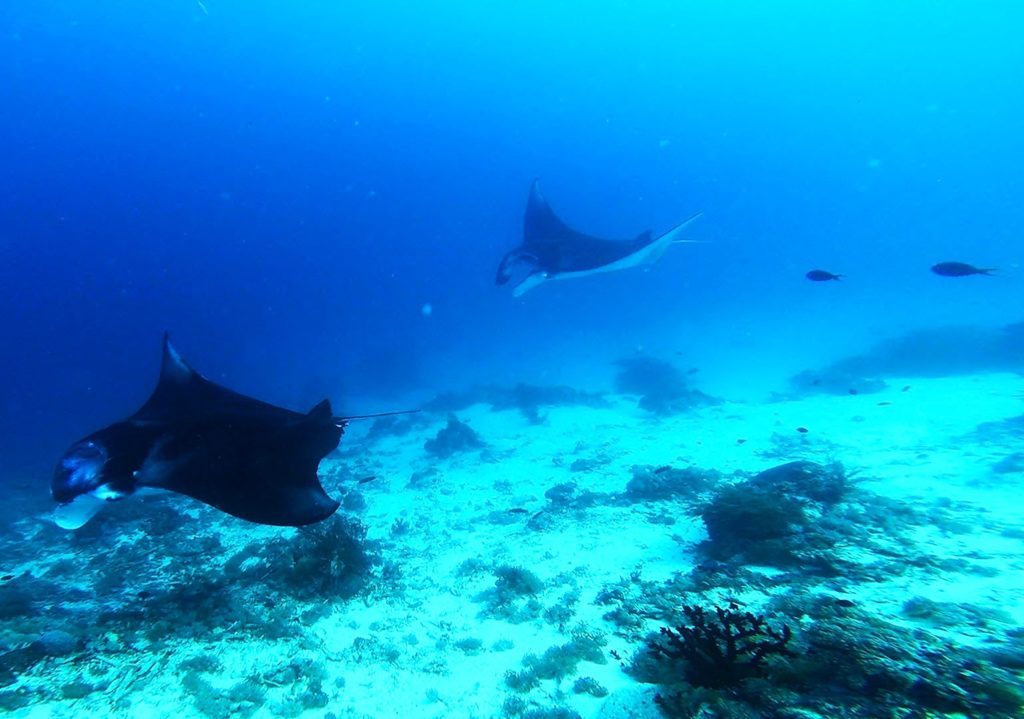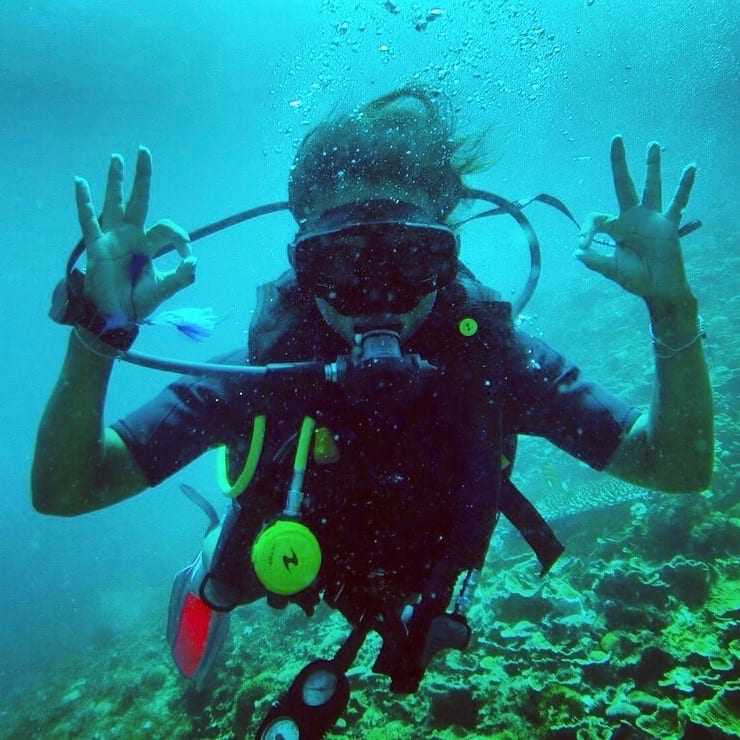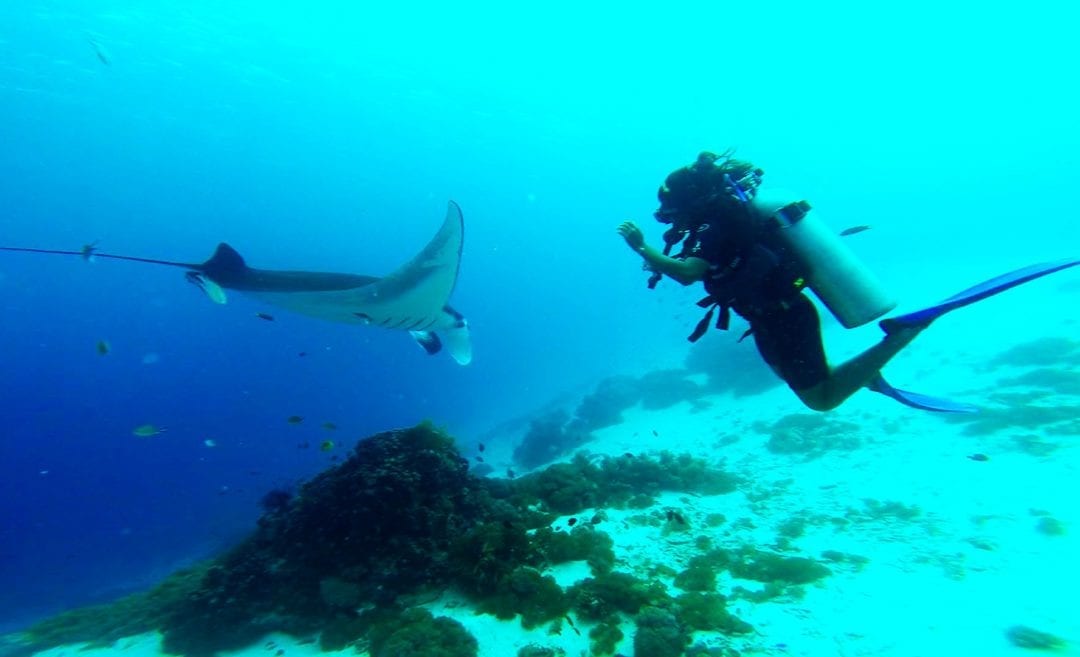Scuba diving opens up a whole new world of excitement and adventure. The ocean covers around 70% of our planet, which means that we miss out on SO much by limiting our exploration to land. Personally, diving is one of my favourite activities, and I love the sense of freedom that comes with it. It’s also amazing not knowing what marine life, vistas, reefs, and sights you’ll come across on your dive.
My first ever diving experience was in Sardinia in Italy. I then completed my PADI Open Water Course in Indonesia, and i’ve since been fortunate enough to dive in a number of destinations, including Mexico, the Philippines, and Canada. Having a diver boyfriend definitely helps (Matt’s a Master Scuba Diver Trainer & has been teaching for years), so it’s nice that we can share our love for diving and explore new dive sites together.
I still remember my first dive and all the questions I had before my first lesson: How do you breathe? What kind of air is it? What do you wear? What if your mask fogs up? What do you see down there? And the list goes on. It’s only natural to feel a little scared and apprehensive and wonder what the whole diving thing is all about, especially because it’s so different to anything else we do. I want to clarify now that diving is COMPLETELY safe, and if you can breathe and exist on land, then you can breathe and exist underwater too.
I think scuba diving sounds much scarier and harder than it is. Personally, I actually find diving easier than snorkeling – I always tend to choke on water when I snorkel and it annoys me that I can’t hold my breath long enough to dive down and check out the marine life. Diving is much more calming and you have the ability to discover so much more, which I love.
So if you’re yearning for adventure and preparing for your first time underwater, here are my top scuba diving tips for beginners and a few principles to keep in mind when you explore the underwater world!

1) Breathe Normally
My best tip for beginner divers is just to breathe normally. Don’t hold your breath, don’t hyperventilate, just breathe normally. Like you would on land. If you’re a little nervous about diving, controlling your breathing will help to calm you down. Normal breathing also helps to control your buoyancy, and because you consume less air when your breathing is slow and controlled, your air supply lasts longer so you can dive for longer. Breathing out of a regulator (the mouthpiece that feeds you oxygen) feels a bit different at first, but you quickly get used to it. It’s also good to know that the air you breathe underwater is exactly the same as what you breathe on land – nothing fancy, just plain old air!
2) Do Everything Slowly
One of the golden rules of diving is that everything should be done slowly – that includes your breathing, your movement, and your ascent and descent. When you flap around and try to do everything quickly, it’s easy to get yourself worked up, scare off wildlife and consume more air and energy. Diving is definitely not a fast sport. Don’t ever feel pressure to do anything fast – just take it easy and go at your own pace. Going slow is especially important when you’re coming up to the surface because you need to allow your body to adjust to the pressure change. Doing everything slowly also allows you to take in your surroundings and appreciate where you are!
3) Equalize Regularly
Just like you have to equalize your ears when you go on a plane, you need to equalize your ears when you dive. The purpose of equalizing is to match the pressure inside your ears with the pressure in your outside environment (i.e. the ocean). You can equalize your ears by pinching your nose and gently blowing, by swallowing, or adopting any other method that feels most comfortable. Never forcefully try to equalize your ears, and if your ears ever feel painful, tell your instructor immediately and he/she will guide you. Chewing gum before the dive (not during!) will help to loosen up your ears, and I recommend equalizing every minute or so, or possibly more frequently depending how quickly you’re descending. You can never equalize too often (I do it very often), so it’s good to get into the habit of doing it.
4) Dive Healthy
If you’ve got a cold, you’re run down or you’re badly hungover, postpone your dive. Congestion or blocked sinuses can make equalizing very difficult, if not impossible, and as I just mentioned above, your body needs to be able to equalize its air spaces to match the outside pressure. Don’t just pop some decongestion medication to fix it either – it can easily wear off mid-dive which can land you in trouble if you then can’t equalize. If you’re hungover or you’re just not feeling on good form, this can increase your risk of injury as you won’t be as focused so your performance will be affected. Diving is fun, but you have to take it seriously. Know your limits, and if you don’t feel up to it, take it easy and try again another day.
5) Spit In Your Mask
This sounds really gross, but I promise you, it works! Spitting in your mask pre-dive is the best way to keep your mask clear underwater and prevent it from fogging up. However, even if your mask does fog up, it can easily be fixed by rinsing out your mask underwater. This is one of the first things your instructor will teach you, along with what to do if your mask fills up with water. It can occasionally happen, but there is a really simple trick to clear your mask of water while under the surface, and you don’t even have to get your eyes wet (diving is fine if you wear contact lenses too).
6) Stop, Think, Solve
No problem can’t be solved underwater. If your mask fills up with water, you can fix it underwater. If your ears hurt a little from the pressure, you can fix it underwater. Bolting to the surface can be really dangerous, so if you ever encounter a problem, stop, think about it, and solve it!
7) Take It Easy And Enjoy It!
A lot of people think diving is harder or scarier than it is. And that’s normal – you see divers geared up with all sorts of equipment and tanks and masks, so of course it looks difficult and technical. However, as you get used to it, you soon realize it’s not as crazy as it looks. Just take it easy, keep an open mind, and enjoy it! And if you’re not sure about committing to a full Open Water Course, Discover Scuba courses are a great introduction and can be done in the pool or off the beach. Besides, you’ll never know unless you try it!
Got any more questions about diving? Drop me a comment below!



10 Comments
These scuba diving tips are incredibly useful for beginners! I especially appreciate the advice on equalizing and staying calm underwater. It’s also great to see reminders about the importance of safety and proper training. This guide is a great starting point for anyone planning their first dive! Visit : http://www.orcadiveclub.in/
Excelent tips…Thank a lot’s for info…
I just want to thank for sharing this amazing post……
Author
Thank you!! 🙂
Impressing pictures.
Thank you for posting. I enjoyed reading. 😀
That’s exactly what I am looking for. Thanks for this post. I love your blog and all the ideas you shared about outdoor experiences. Keep it up!
Author
Thanks so much Nikki, really glad you found it useful!! 🙂 Have an amazing time Diving if you go! xx
Thank you for the excellent scuba diving tips for beginners. A really great guide.
Alicia – these are great tips for anybody starting to dive. Start slow and don’t overestimate your abilities and the rest comes by itself!
Author
Thanks so much James. Diving looks and sounds much more daunting than it is, but when you go down there you realize it’s actually such a liberating experience! I love it!